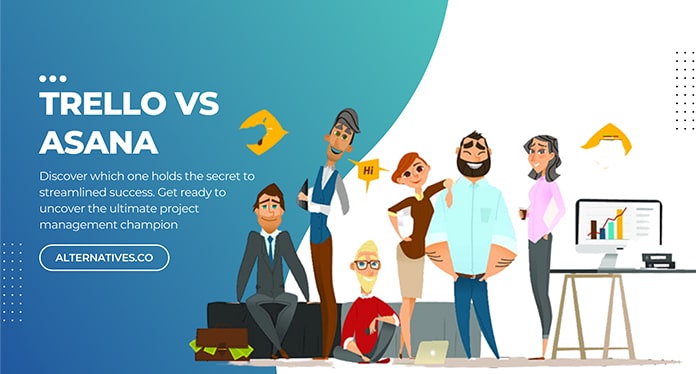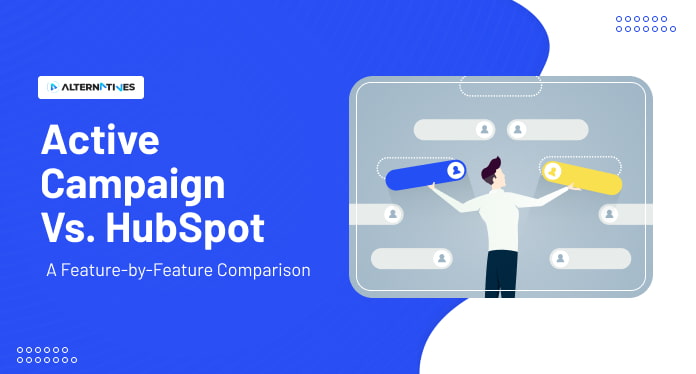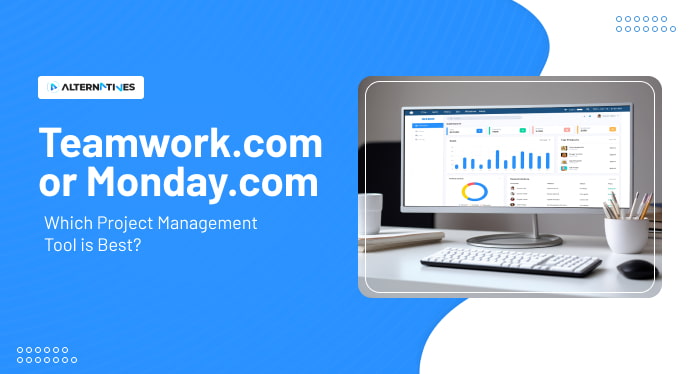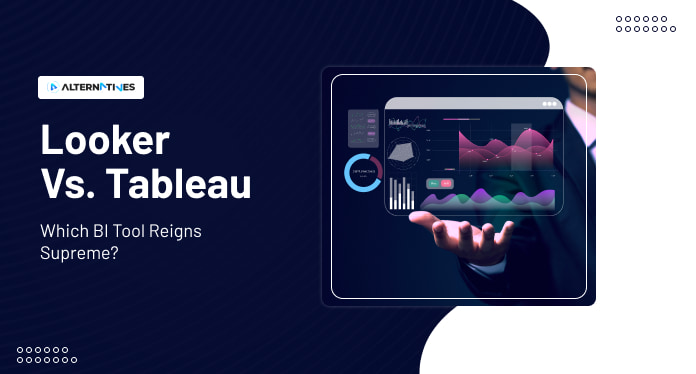HubSpot Vs Salesforce Comparison – Which is the Best CRM?

Customer Relationship Management (CRM) systems are essential tools for businesses looking to manage their customer relationships and sales processes. With so many CRMs on the market, it can be difficult to determine which one is right for your business. Two of the most popular CRMs on the market today are HubSpot and Salesforce.
In this article, we will compare these two CRMs in terms of features, pricing plans, ease of use, customization capabilities, customer service, scalability, and more. We’ll also take a look at some alternatives to HubSpot and Salesforce and review some key security features. By the end of this article, you should have a good understanding of how both systems measure up against each other and be able to make an informed decision as to which system is best for your business.
Overview of Features
When it comes to features, Salesforce offers a more comprehensive suite of tools, while HubSpot is better suited for those looking for an intuitive, budget-friendly option.
For sales teams, Salesforce provides data visualization and automation capabilities that make managing complex customer relationships easier. It also has AI capabilities that allow users to generate insights from their data quickly. Additionally, its reporting tools are robust and offer extensive customization options.
On the other hand, HubSpot's main strength lies in its email marketing capabilities which are well integrated with its CRM system. It also offers basic reporting functions but lacks some of the advanced features found on Salesforce such as automated lead scoring or custom fields.
Lastly, both systems have integrations with popular third-party apps like Google Analytics and Slack, making it easy to use them together for maximum efficiency.
Ultimately, the best choice between these two depends on the user’s needs and budget.
Pricing Plans
Both CRMs offer various pricing plans, but you really get what you pay for – HubSpot's pricing plans are more affordable, while the pricing of Salesforce provides a lot of bang for your buck.
When considering which system to choose, it’s important to factor in the cost analysis and annual pricing strategies that are available. Below is an overview of the different plans offered by both companies:
| Pricing Plan | Salesforce | HubSpot |
| Free | N/A | Free (limited features) |
| Basic | $25/month | Starter ($50/month) |
| Professional | $75/month | Professional ($400/month) |
| Enterprise | Custom Price | Enterprise (Custom Price) |
When making a decision between the two systems, users should also look at user contracts and money-back guarantees provided by each company. Both offer flexible payment options and discounts for long-term commitments. Ultimately, the best system for any business depends on its individual needs and budget.
Ease of Use
When it comes to ease of use, HubSpot offers a lightweight platform and user-friendly interface while Salesforce provides a more feature-rich experience.
For users just getting started with CRM software, the simple user interface of HubSpot is ideal for quickly learning how the system works. Automation tools are also straightforward in HubSpot, making it easier to automate processes without needing significant technical knowledge. However, there can be a steep learning curve when it comes to using all of the features provided by Salesforce. Additionally, data migration from other systems may require additional setup that could add complexity for inexperienced users.
In terms of analytical tools, both platforms offer powerful solutions for tracking customer interactions and understanding their behaviors. However, Salesforce has an advantage due to its wide range of integrations and add-on services that allow businesses to access real-time insights into customers' activities. This makes it easier for companies to gain valuable insights into their customer base and improve marketing strategies accordingly. On the other hand, HubSpot does not have as many integrations and therefore lacks in this area compared to Salesforce.
At the end of the day, which system is best depends on individual needs and budget constraints. While HubSpot offers an easy-to-use platform at an affordable price point, those who need advanced analytics or customizations may find better value in Salesforce despite its higher costs. Regardless of which option is chosen, having a comprehensive CRM system will ensure smooth business operations and improved customer relationships over time.
Integration Options
With a wide range of integrations and add-on services, Salesforce provides businesses with real-time insights to gain valuable customer data and improve their marketing strategies. Integrating with third-party tools allows for data syncing which makes it easier to keep track of customer information across multiple platforms.
Automation benefits can be gained from integrating with Salesforce as well, allowing for bulk actions such as lead generation or task scheduling. Lastly, reporting tools are available that allow users to monitor sales performance in order to make informed decisions about the business.
In comparison, HubSpot also offers integration options but is not quite on par with the features provided by Salesforce. They offer an app marketplace full of apps and integrations designed to help manage customers more efficiently and effectively. However, unlike Salesforce, HubSpot does not have the same level of customization when it comes to customizing reports or adding additional elements to workflows. This could prove problematic if a company needs very specific kinds of automation or customizations.
Overall, both systems provide plenty of integration options but when it comes down to capabilities Salesforce has an edge over HubSpot due to its extensive feature set and higher level of customization. Businesses considering either system should take into account their own unique needs when making their decision so they can choose the best CRM for them!
Customization Capabilities
Customization capabilities are an important factor to consider when selecting the right customer relationship management system for any business, with Salesforce boasting a wide range of features and a higher level of customization than its competitor.
With Salesforce, users can easily migrate data from other systems, add custom fields, and automate processes with tools like Flow Builder. It also offers advanced dashboard design options that enable users to create visually appealing reports. Additionally, it has robust reporting tools that allow businesses to gain insights into their sales performance and make better decisions in the future.
On the other hand, HubSpot’s customization is more limited compared to Salesforce as most features come pre-configured. Although it does offer some basic functionality such as creating custom dashboards and automating tasks with Workflows, they don’t have the same depth or flexibility as those found on Salesforce. The user experience is much simpler compared to Salesforce but this comes at the cost of fewer customization options available.
In conclusion, businesses should weigh their needs carefully before deciding which CRM system would best suit them – whether it be comprehensive yet expensive Salesforce or comparatively cheaper yet less customizable HubSpot. Data migration capabilities, automation tools, custom field creation possibilities, dashboard design abilities and reporting tool availability should all be taken into account before making a decision.
Customer Service
The customer service offered by each CRM system should be weighed carefully when selecting the right one for an individual business, as it can be a deciding factor in achieving success.
Salesforce provides robust support with its 24/7 availability and automated solutions that are designed to help customers quickly resolve issues. Additionally, their team of tech experts is always available to provide personalized assistance whenever needed.
HubSpot also offers great customer service options with its live chat feature and help desk that allow businesses to get immediate answers to any questions they may have. It also features automation tools that make it easier for customers to find solutions to common problems without having to contact customer service representatives directly. Lastly, HubSpot has an extensive library of educational resources and tutorials available on its website. Overall, both Salesforce and HubSpot offer excellent customer service options for different needs and budgets.
While Salesforce is more expensive than HubSpot, its advanced features make up for the cost difference and ensure businesses receive the best support possible. On the other hand, HubSpot’s free plan is an attractive option for small businesses looking for basic but effective customer service capabilities at a lower price point.
Scalability
When selecting a CRM system, scalability should also be taken into account in order to determine if the platform can accommodate any growth or changes in needs. Both Salesforce and HubSpot offer great scalability options that are tailored for different types of businesses.
Cost Efficiency:
- Salesforce: Offers cost-efficient solutions with pay-as-you go pricing models.
- HubSpot: Provides flexible plans depending on company size and budget.
Data Management:
- Salesforce: Enables users to store customer data securely and manage it efficiently across multiple channels.
- HubSpot: Gives access to powerful data analysis tools without requiring extra resources or technical expertise.
Automation Benefits:
- Salesforce: Automates numerous processes, such as task management, sales forecasting, lead generation, etc., which saves time and costs.
- HubSpot: Allows automation of mundane tasks like email marketing campaigns, social media engagement, etc., providing an improved user experience.
User Experience:
- Salesforce: Robust features may require more training but provide customizable dashboards and reports for better insights.
- HubSpot: Simple interface makes it easier to use while still offering automated reporting capabilities at lower prices than other systems.
Both platforms offer different levels of scalability based on their individual strengths. For example, Salesforce offers cost efficiency through its pay-as-you-go model, whereas HubSpot provides flexibility with its various plans depending on your company size and budget. Additionally, both enable users to store customer data securely and manage it efficiently across multiple channels. However, Salesforce provides more robust features that may require more training but give you access to customizable dashboards and reports for greater insights into customer behavior. Lastly, they both allow automation of mundane tasks like email marketing campaigns and social media engagement, which helps improve user experience while saving time and costs compared to manual methods. HubSpot is particularly advantageous here due to its simple interface combined with automated reporting capabilities at lower prices than other systems.
Alternatives To HubSpot and Salesforce
When choosing a CRM system, there are other alternatives to consider besides HubSpot and Salesforce that may provide better scalability, cost efficiency, data management, automation benefits, and user experience.
Zoho CRM is one such alternative to Hubspot that offers features like reporting tools for tracking customer performance and automated workflow processes for improving customer relations. It also comes with an easy-to-use interface which makes it great for businesses of all sizes.
Pipedrive CRM is another option that provides powerful sales pipelines to help companies track leads more effectively. Microsoft Dynamics is yet another popular choice among business owners due to its robust set of features and extensive integration capabilities. If you are on the lookout for a reliable competitor to Salesforce, then Freshsales is a decent choice.
Freshsales CRM is suitable for small businesses as it offers simple pricing plans but still packs in plenty of useful features like lead scoring and visual insights on your customers. Lastly, LeadSquared CRM stands out by offering marketing automation capabilities and the ability to add custom fields or stages in their pipeline view.
Overall, each alternative has its own unique advantages when compared against HubSpot or Salesforce. Companies should evaluate what they need from their CRM system before deciding on the best fit for them.
Businesses must carefully weigh up the pros and cons of each solution before settling on the right one for them. Ultimately, the best system depends on individual needs and budget considerations – so be sure to do your research!
Security Features
No matter the choice of CRM system, it’s essential to consider the security features available to protect customer data.
Both HubSpot and Salesforce offer a variety of tools and services that ensure secure storage and transfer of sensitive information:
- Data Encryption both systems use strong encryption algorithms to protect customer data from unauthorized access.
- Cloud Hosting both platforms provide reliable cloud hosting solutions with advanced security protocols in place.
- User Access each platform offers user-based access controls that allow you to limit who has access to certain parts of your data or functionality.
In addition to these basic security measures, both HubSpot and Salesforce also have additional features such as Security Policies, Firewall Protection, and Identity Verification Services. These extra layers of protection help companies maintain compliance with industry standards while keeping their customers’ data safe.
Finally, both solutions are constantly updating their security practices in response to emerging threats so businesses can rest assured that they are getting the most up-to-date protection possible.
Mobile Accessibility
With mobile access becoming increasingly important, both CRM systems offer apps that allow users to manage their customer relationships on the go.
Salesforce and HubSpot provide different levels of mobile accessibility:
- Offline Access: Both platforms enable offline access for some features, but Salesforce offers more robust support with its ability to sync data across devices.
- Device Support: Both systems are compatible with iOS and Android devices, though HubSpot is available on Windows Phone as well.
- Mobile-Specific Features: Salesforce has a greater selection of exclusive features designed specifically for mobile use, such as integrated voice commands and an interactive home screen dashboard.
- User Interface: The user interface of each platform differs significantly in design and navigation; while HubSpot’s is simpler and easier to learn, Salesforce provides a more comprehensive experience with multiple tabs and options.
- Push Notifications: Users can receive notifications from either system when customers take action or respond to emails sent through the app. However, only Salesforce lets you customize push notifications according to your preferences.
In conclusion, both Salesforce and HubSpot have advantages when it comes to mobile accessibilitySalesforce offers more advanced functions while HubSpot provides a simplified interfaceso companies should consider their needs carefully before deciding which one would be best suited for them. Ultimately, the choice depends on budget constraints, desired customization levels and scalability requirements of the business in question.
Third-Party Apps
When it comes to extending the capabilities of their CRM systems, businesses have a range of third-party apps available to them from both HubSpot and Salesforce. Both platforms offer integration with data visualization tools, automation tools, chatbots, reporting tools and collaboration tools.
However, when comparing these two options for third-party app integrations there are some distinct differences between each system. Salesforce offers an extensive library of add-on services through its AppExchange platform which includes more than 4,000 applications that can be used to further customize one's CRM experience. These include apps designed for data analysis and visualization as well as automated marketing campaigns and customer service solutions. It also provides access to several reporting tools, including ones specifically created for Salesforce users.
HubSpot does not provide access to nearly as many third-party apps as Salesforce but still offers a wide selection of useful integrations such as those related to sales management, marketing automation, customer support and analytics/reporting. Additionally, HubSpot has recently added collaboration features such as project tracking and task management that can help teams better communicate internally on projects or tasks within their CRM system.
Ultimately, choosing the best option among these two platforms depends on the specific needs of the business in terms of budgeting constraints and desired customization levels.
Review and Analysis of Hubspot and Salesforce
Weighing the pros and cons of both Salesforce and HubSpot, businesses can make an informed decision on which system will provide them with the best way to streamline their customer relationship management.
When comparing Salesforces and Analysing Hubspot, it’s important to consider various aspects such as cost, scalability, features, customization levels, integrations, data analysis capabilities, and reporting tools.
The table below helps illustrate some of the key differences between Salesforce and HubSpot:
| CRM Benefits | Salesforce | HubSpot |
| Cost | Premium plans only | Free plan & premium plans available |
| Scalability | Highly scalable | Moderately scalable |
| Features | Rich feature set | Lightweight alternative |
| Customization Levels | High | Limited |
Automation benefits are another big consideration when evaluating a CRM provider. Both Salesforce and Hubspot offer automation tools like automated workflows that help simplify and speed up routine tasks for sales teams. However, Salesforce has more robust automation capabilities compared to Hubspot's lightweight offering.
Additionally, Salesforce offers advanced analytics capabilities that allow users to analyze large amounts of customer data quickly and easily in order to get valuable insights into customers’ needs and preferences. Lastly, reporting tools in Salesforce enable users to generate detailed reports based on various criteria for better business decisions.
Ultimately, companies should carefully weigh all factors before making a final decision about which CRM is most suitable for their individual needs.
Frequently Asked Questions
1. Is it possible to switch from HubSpot to Salesforce?
Yes, it is possible to switch from HubSpot to Salesforce. The integration process requires data migration and can be complex depending on the amount of data being transferred. Depending on user experience with either platform and familiarity with the new system, there may be a learning curve associated with making the change. Additionally, pricing models between Salesforce and HubSpot differ significantly so it’s important to consider which model fits best for your needs before switching platforms.
2. What types of data analysis capabilities are offered by HubSpot and Salesforce?
Both HubSpot and Salesforce offer data analysis capabilities such as custom reports, data visualization tools, automation tools, pricing plans, and security features. With HubSpot’s free plan, users have access to basic reporting features and can customize their own reports. Salesforce offers more advanced analytics with its paid plans which include a range of options for data visualization and automated updates. Both systems provide powerful security measures to protect user data.
3. How long does it typically take to implement HubSpot or Salesforce?
The amount of time it takes to implement HubSpot or Salesforce depends on the size and complexity of the project. Factors such as customizing setup, data migration, user training and pricing plans all play a role in determining implementation time. Typically, it can take anywhere from one week to several months for full implementation depending on these criteria. Both systems offer customer support that can help you get up and running quickly.
4. Does HubSpot offer any discounts for non-profit organizations?
Yes, HubSpot offers discounts for non-profit organizations. They offer a 10% discount on monthly subscription fees and up to 25% cost savings when using their annual payment plan. Additionally, they provide feature comparisons with other CRM systems, security measures, and nonprofit benefits that can help save time and money. By taking advantage of these discount strategies, nonprofits are able to get the most out of this powerful CRM system without breaking their budget.
5. Can different teams within a company use different CRMs?
Yes, different teams within a company can use different CRMs. However, this presents certain integration challenges such as system customization and migration strategies. Companies must also consider pricing models and user accessibility when deciding which CRM to choose for each team. In addition, if one team changes its CRM it may be necessary to migrate data between systems in order to maintain the same level of efficiency across all departments.
Conclusion
In conclusion, it’s clear that HubSpot and Salesforce are both valuable CRM solutions. Like a chess game between two grandmasters, they each have strengths and weaknesses to consider when making the right choice for your business.
Ultimately, there is no one-size-fits-all solution – like choosing between apples and oranges – but with careful consideration of features, pricing plans, ease of use, integration options, customization capabilities, customer service scalability, and other factors; you can make an informed decision on which system best suits your needs.



